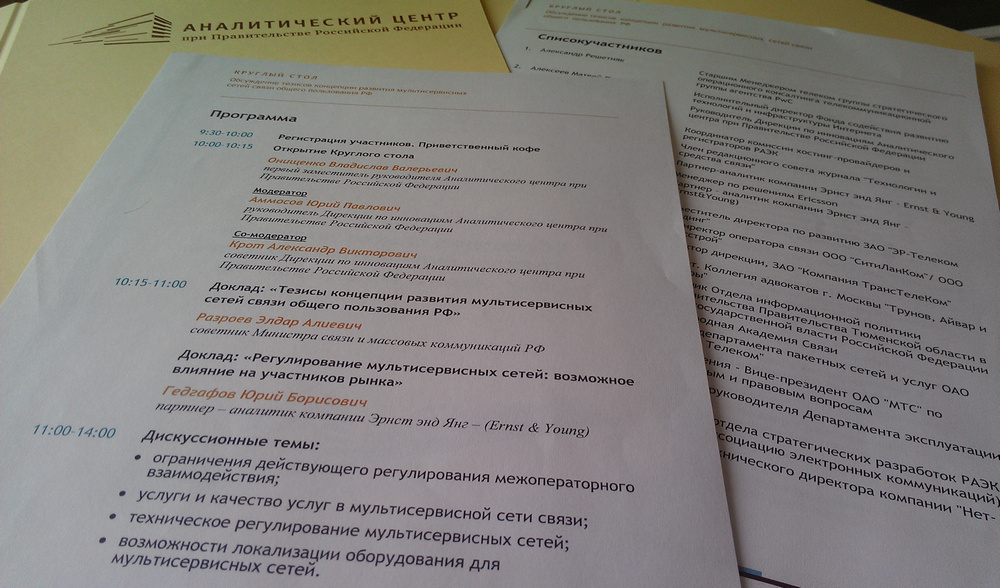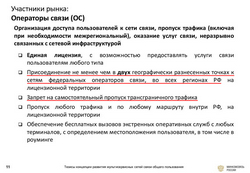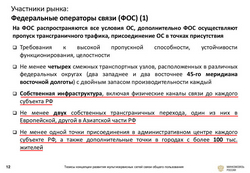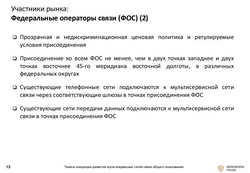Ministry of Communications will shake up the operators market

Let me remind you that earlier Habr literally blew up the post “How to close the Internet in Russia”, in which the nearest and distant plans of the Ministry of Communications and Mass Communications were conveyed to the general public.
The ministry developed a thesis concept under the name “Development of Multiservice Communication Networks of Common Use of the Russian Federation”, in which it presented, let's say, an interesting vision of the development of the market and the future infrastructure of telecom operators.
It became terribly interesting to everyone (underline the necessary).
Therefore, the entire IT industry and a significant part of the Internet public were eagerly waiting for the representatives of the Ministry of Communications to give detailed explanations of their vision for the “new wondrous world.” It happened on August 22 at a round table in the Analytical Center under the Government of the Russian Federation. I was able to attend this event, which, by the way, turned out to be not so difficult — I just needed to know what it would be like and send a request for participation.

')
So, as expected, the round table was a full house, in the program there were as many as 55 names of participants, among which were
In a word, morning did not promise to be languid.
If you make a retreat, the main points that market participants and the Internet public were concerned about on the eve of this meeting were:
1) the upcoming global redistribution of the market of telecom operators and their division into federal and ordinary (FOS and OS):



(pictures are clickable)
2) increased monopolization of the market by the only (by some estimates) federal operator;
3) an aggressive solution to the problem of high-speed "last mile" (or otherwise eliminate digital inequality) at the expense of exorbitant costs imposed by small providers;
4) the concentration of market-regulating levers for future federal operators affiliated with state structures;
5) the increase in the price for traffic due to all of the above, which as a result will affect the final price of the cost of Internet services for the subscriber;
6) well, the most hot-talking moment in the Internet environment is the transfer of cross-border traffic entirely into the hands of federal telecom operators.
And at the round table the position of the Ministry of Communications and Mass Media was represented and defended by Advisor to the Minister of Communications Eldar Razroev and Deputy Minister Denis Sverdlov.
In order not to engage in self-citation, I recommend that you thoroughly read the relevant review on the NAG portal with a detailed course of reports, speeches and discussions, as well as video recordings .
Here I will give slides from the round table, which are still currently exclusive, squeeze from the meeting and afterword / comments / reaction from other participants of the meeting.
So, Eldar Razroev presented the report “Abstracts of the concept of development of multiservice communication networks of the general use of the Russian Federation”:
( presentation )
And Yury Gedgrafov, an analyst at Ernst & Young, clearly showed how the ministry’s thesis concept could affect the industry: “Regulation of multiservice networks: a possible impact on market participants”:
( presentation )
Dry squeeze on the round table:
1) All market participants (and large operators too) are dissatisfied with the vision of the development of communication networks from the Ministry of Communications.
2) Regulators (Roskomnadzor and FAS) have many critical comments on the current concept of development.
3) Suddenly - Rostelecom almost the most severely criticized theses embedded in the concept.
4) When building a new principle of interaction, the old scheme also remains.
5) How long the licenses will be valid and renewed under the old interaction scheme - no clear answer was given.
6) Who owns cross-border traffic - in the future it will not be taken away, but only if the operator does not choose a new interaction scheme.
7) A clear answer is not given - should more than 100 thousand of the population (and in the future from 8 thousand) need to pull the “cable” to all cities or you can use the “satellite”.
8) The state will not invest in the infrastructure for the development and construction of communication networks, but will invest in demand, buying out the excess capacity of the newly built channels.
9) Estimates differ greatly in the number of future federal operators: someone claims that the WCF will clearly be one, someone talks about the "big five", and the Ministry of Communications insists that their number may well be about 10.
10) The same for the cost of entering into the WCF, according to various estimates, it will be in the range of $ 0 to $ 1 billion of the same evergreen.
11) The concept has a very tight deadline, there is no economic justification, there is little analytical elaboration, such its implementation can adversely affect the entire economy of a country.
12) Containers (Yandex, Google, MailRu, etc.) as significant beneficiaries from the development of communication networks are strongly encouraged to participate in their construction.
13) The inevitable increase in the cost of services for the subscriber, as a result of the huge costs imposed by the state on the operators according to the future concept.
In a word, the new explanations of the representatives of the Ministry of Communications and Mass Media clarified some points, and some others were aggravated by a general misunderstanding.
And in fact - there is no holistic concept. The industry is urging the Ministry of Communications to provide high-quality analytics and a well-developed program.
You can follow the reaction in the media after this meeting:
( link ) "What will the appearance of a federal Internet provider lead to?"
( link ) "Changes in Internet regulation in Russia brought experts to a standstill"
( link ) "Parallel multiservice"
( link ) "The concept of the Ministry of Communications and Mass Media was criticized by the Documentary Telecommunications Association (ADE)"
( link ) "The deadline for closing the border for Internet providers is not set"
( link ) "Concept in a bag"
( link ) "Business is afraid of multiservice networks"
Also interesting is the fact that the Minister of Communications, Nikiforov, never once commented on either the concept itself or the response of the industry and the public to it.
But one of the developers of the concept Eldar Razroev gave explanations after the reaction in the network went according to his report.
Who has a Facebook account - can take advantage of the proposal of the adviser to the Minister :
“I answer the same questions several times. To be honest tomily. I propose to do this "on my wall" in order not to repeat. Ask a question - I answer. Only pzh without lyrics, and as concisely as possible. "
Also in the FB, 2 interesting discussion threads are developing on the topic with the heavyweight participants in the industry, where you can fit in and offer your theses and comments to prominent players and regulators of the communications market: ONCE and TWO .
In short, the discussion and discussion continues, and we are all waiting for the detailed analytics and roadmap promised from the Ministry of Communications and Mass Media.
Source: https://habr.com/ru/post/191544/
All Articles